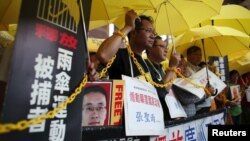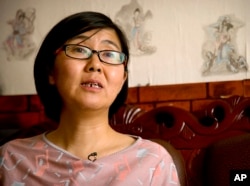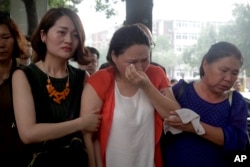A court in Tianjin Tuesday handed down a guilty verdict for Chinese rights defender Zhai Yanmin, who was given a three-year jail term with a four-year probation period after being found guilty of “state subversion.”
Activist arrested, detained
Zhai’s verdict came one day after the alleged release of lawyer Wang Yu, both of whom were among those 300-odd rights activists arrested since China started its nationwide crackdown on lawyers last July.
Human rights groups questioned the fairness of Zhai’s trial, which they say has been marred by multiple procedural violations including a three-day notice to Zhai’s family. Three other rights activists – Hu Shiquen, Zhou Shifeng and Li Heping on the same charge of subversion – were also said to be standing trial on Tuesday, but no court decisions have been disclosed yet.
Zhai’s wife, Wang Qianling, has been restricted from leaving home since late last week and was never informed of the trial, according to the group Chinese Human Rights Defenders.
Rights groups argued that the verdict, along with Wang Yu’s public confession, aim to send a warning to other rights advocates in China.
Coerced confession
“They want to make an example out of one individual. And the other activists are the ones who will be given the most harsh sentences and be under control for years, but might not be imprisoned immediately,” the rights group’s researcher Frances Eve said.
Since 2014, Zhai, 55, had been detained several times for rallying for the release of other rights defenders and supporting the Occupy Hong Kong protests.
After being taken into custody, he pleaded guilty this June during a televised confession on state CCTV.
In his closing remarks on Monday, Zhai told the court that he accepted the ruling and has no intention to appeal.
“After my business venture went bumpy, I befriended with the wrong group of people and learned about subversive theories such as democratization, a multiple-party system and the peaceful transfer of power,” Zhai said, according to a video posted on local media.
“After reflecting on what I have done in the past, I now feel deeply regrettable,” he read from a pre-scripted statement.
During an exclusive interview aired on local media on Monday, lawyer Wang Yu also expressed her remorse over having collaborated with so-called “foreign hostile forces.”
“[I’ve been] to countries including England, Switzerland and Thailand, where I was given trainings and attended meetings on how to attack and smear the Chinese government as well as tactics to avoid investigation,” Wang said.
“Those were very wrongful actions. And I will never be used by those people,” she added without identifying who those people are.
In contrast to her usual style of being articulate and eloquent, Wang appeared to speak in broken sentences from time to time.
She said that during her year-long detention, her legal rights have been well protected while pointing fingers at her colleague Zhou Shifeng, head of Fengrui Law Firm in Beijing, as an incompetent lawyer.
Scripted confession
Li Yuhan, one of the two lawyers representing Wang Yu, believed that the detained lawyer wasn’t speaking her mind freely.
Well-versed in Chinese law, Wang Yu should have known better that her rights have been infringed and she is not guilty of any charges – solid facts which Li said only made her public confession unreasonable.
“My partner Wen Donghai and I have firmly believed that she has broken no law. Even if she had over-reacted during past court sessions, those behaviors didn’t constitute any criminal offense,” Li said.
Wen, another defense lawyer of Wang Yu, was barred from leaving China in March on suspicion of endangering state security.
Kit Chan of Chinese Human Rights Lawyer Concern Group, also suspected that Wang Yu’s confession was coerced as it was similar to that of Zhao Wei, whose whereabouts remain a mystery after her alleged release in early July.
“So the message behind the Chinese government’s maneuver is clear – to make her “self-incriminate,” discredit the rights lawyers’ community and to set the tone for upcoming trials on rights activists,” Chan said.
“Inside China, they can create a kind of public opinion. See! This person, who is the main figure in the incident. She came about to criticize the lawyers’ community as shepards of cases. They have been creating troubles. And this is the kind of message wanting to spread inside China to prepare for the trials,” she argued.







